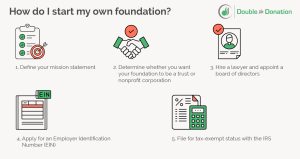Nonprofit Basics: Starting a Foundation
Interested in establishing a permanent positive impact? Starting a foundation is a great way to further the social good initiatives you care about. Individuals, families, and corporations are all eligible parties that can start their own foundations.
If you’re looking to create a long-lasting family legacy or have become increasingly aware of an unmet social need, starting your own foundation will propel your ideas forward. Let’s break down some foundation basics.
What is a foundation?
A foundation is a charitable trust or nonprofit organization typically formed to provide charitable grants to other organizations or institutions. Foundations can support a variety of different causes such as those related to science, religion, education, or culture.
There are two foundation types: public foundations and private foundations. Public foundations are funded by a variety of sources, such as individuals, private foundations, or government entities. These separate sources make it easier for the foundation to decrease its financial risk by diversifying its revenue. The majority of community foundations are public foundations which are also known as grant-making public charities.
Private foundations are typically funded by individuals or families. Private foundations are subject to greater regulations by the IRS as they must meet a certain yearly “payout requirement”. Oftentimes, private foundations are a direct reflection of individual or family values. The Bill and Melinda Gates Foundation is a well-known example of a private foundation. Some other examples of private foundations include family foundations, corporate foundations, and private operating foundations.
What are the benefits of starting a foundation?
There are several benefits that come with starting a foundation. Some of these benefits are tangible while others may be more reflective of individual values. Here are a few to consider:
- Ability to leave a legacy. Foundations can be started for very personal reasons. Private foundations offer an opportunity for families to bond or grieve together. Many times, foundations are started to carry on a family name or honor the life of a passed family member. Cancer research foundations are often created because of this precedent.
- Access to tax benefits. When legally registered as a 501(c)(3), the IRS recognizes foundations as tax-exempt. In other words, they can accept donations without having to pay taxes on them. Additionally, with a few restrictions, the donors can claim their contributions as tax deductible.
- Ability to directly control your charitable giving. Being charity-minded without a giving plan can be overwhelming. With over 1.5 million nonprofits in the U.S. alone, there is no shortage of causes that could use resources. But how do you know you’re funding a cause that captures your values? Starting your own private foundation is one way to be sure you’re giving to a cause that matters to you.
How do I start my own charitable foundation?
If you’ve decided that now is the time to start your own foundation, there are a couple of steps to follow. Be aware that starting a charitable foundation takes time and resources. Therefore, these steps will require careful planning and dedication to complete:
- Define your mission statement. Why are you starting your own foundation? How does your cause respond to a pressing social need? A good mission statement is clear, concise, and memorable. Structure yours in a way that is unique to your cause.
- Determine whether you want your organization to be a trust or nonprofit corporation. Trusts and nonprofits have several key differences: Trusts have fewer regulations for activities like keeping meeting minutes or appointing officers. Nonprofit corporations offer greater protection from personal liability. However, they have more formal regulations to abide by. Other areas of distinction lie in ownership and investment, specific taxation benefits, and general purpose and goals. If you aren’t sure which one is right for you, consider talking with a financial advisor to gain some insight.
- Hire a lawyer and appoint a board of directors. Initial planning as well as ongoing compliance with legal requirements are a must for charitable foundations. Hiring a lawyer and appointing a board of directors will help you keep up with record keeping and tax returns.
- Apply for an Employer Identification Number (EIN). This can be done over the phone or via email.
- File for tax-exempt status with the IRS. Follow IRS guidelines and fill out the necessary forms to apply for tax-exemption.
Being proactive with your foundation’s legal compliance will ensure you are documenting it correctly. Once you have filed the initial necessary paperwork, it is important to prioritize year-round record keeping. Keeping detailed records will help you quickly resolve any financial discrepancies.
Other Resources to Explore
Nonprofit Basics – Learn more about nonprofit management essentials by exploring other expert resources.
Getting Started with Nonprofit Legal Compliance – Gain some more insight on how to adhere to the necessary nonprofit legal requirements.
Grantmaking: Everything New Foundations Need to Know – Read this article for a full explanation of the grantmaking process.



